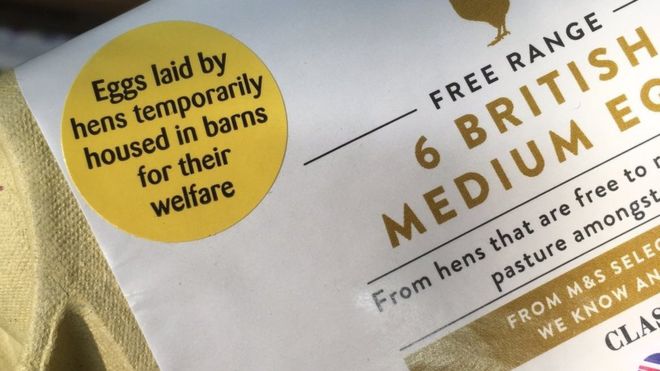
Millions of UK free range eggs will temporarily lose their status after hens were forced to spend weeks inside barns as part of the government's emergency bird flu measures.
Since December, poultry has had to be kept indoors under government orders to prevent the spread of the disease.
There have since been at least ten cases of H5N8 in the UK since then.
Under European Union rules, free range birds can only be housed for a maximum of 12 weeks before their eggs are downgraded to barn. In the United Kingdom the 12 weeks come to an end today (February 28).
From March 1 producers in Scotland, Wales and large parts of England will be able to let their hens out again, but in what Defra sees as higher risk areas birds will still have to be kept in - resulting in eggs being downgraded from free range to barn.
Producers whose eggs are downgraded to barn could lose as much as 20 pence per dozen on their egg price, although some retailers have said they will continue to pay the full free range price.
The partial lifting of the housing order in England has taken some criticism, but the UK's Chief Vet Nigel Gibbens defended the Government's decision during a poultry break-out session at the NFU conference in Birmingham on 22 February.
"We think we have made a sensible risk based judgement to allow free range to resume, while dealing with the higher risk areas."
He said: "We know and we sympathise with those of you who are caught in the 25 per cent of keepers - about 17 per cent of free range producers - who will be required still to house or otherwise net. But we think you are really at high risk."
'Free range egg stickers'
To avoid confusion, the industry has decided to label free range egg cartons with stickers stating the contents were "laid by hens temporarily housed in barns for their welfare".
They started appearing on shelves last week, but will be rolled out fully on Wednesday.
"The need to change labelling of free range egg packs after 12 weeks is an EU requirement," said Mark Williams, chief executive of the British Egg Industry Council.
"However these are all still free range hens but some are temporarily housed to protect them from bird flu.
"Our research shows that consumers are supportive of farmers putting birds' health first and 80% are happy to continue to pay the same price, or more, for eggs from free range flocks temporarily housed inside."
Marks and Spencer is the first retailer to commit to continue paying the free range egg price to producers forced to continue housing birds after the end of February.
Marks and Spencer's have written directly to M&S producers to assure those whose eggs are downgraded to barn from Mach 1 will still receive the free range egg price.
